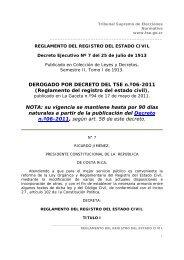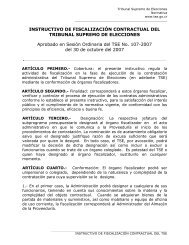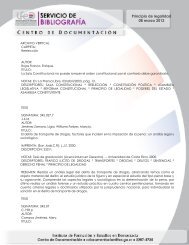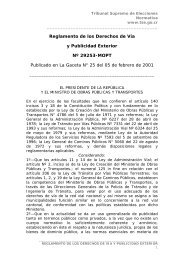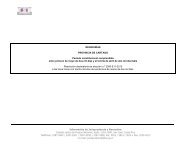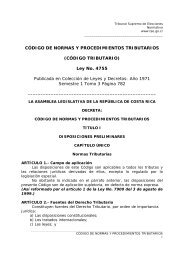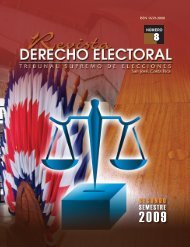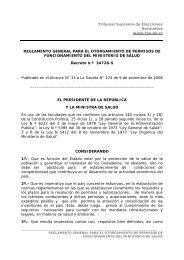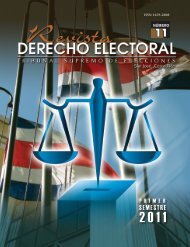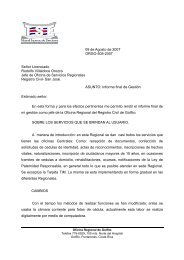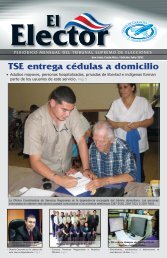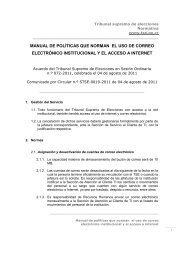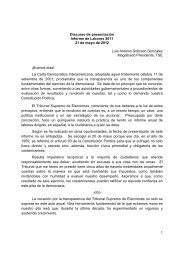9 - Tribunal Supremo de Elecciones
9 - Tribunal Supremo de Elecciones
9 - Tribunal Supremo de Elecciones
You also want an ePaper? Increase the reach of your titles
YUMPU automatically turns print PDFs into web optimized ePapers that Google loves.
El principio <strong>de</strong> paridad <strong>de</strong> género en el nuevo<br />
Código Electoral<br />
Eugenia Ma. Zamora Chavarría *<br />
Nota <strong>de</strong>l Consejo Editorial<br />
Recepción: 14 <strong>de</strong> diciembre <strong>de</strong> 2009.<br />
Revisión, corrección y aprobación: 22 <strong>de</strong> diciembre <strong>de</strong> 2009.<br />
Resumen: El artículo se refiere al Principio <strong>de</strong> Paridad <strong>de</strong> Género que consagra la nueva legislación<br />
electoral costarricense, así como a los diversos aspectos acerca <strong>de</strong> cómo se <strong>de</strong>canta ese principio,<br />
haciendo referencia a las citas legales y jurispru<strong>de</strong>nciales <strong>de</strong>l TSE más importantes que hicieron posible la<br />
concreción <strong>de</strong>l nuevo régimen electoral paritario, a partir <strong>de</strong> la reafirmación <strong>de</strong> que los <strong>de</strong>rechos políticos<br />
<strong>de</strong> las mujeres, son <strong>de</strong>rechos humanos. Analiza la transición <strong>de</strong>l régimen <strong>de</strong> cuota al <strong>de</strong> paridad y los<br />
mecanismos que la hacen posible, tales como la obligación <strong>de</strong> los partidos políticos <strong>de</strong> incluir -<strong>de</strong>ntro <strong>de</strong><br />
sus estatutos- la paridad en sus estructuras internas y en sus nóminas <strong>de</strong> elección popular, así como la <strong>de</strong><br />
que el rubro <strong>de</strong> capacitación partidaria <strong>de</strong>berá ejecutarse <strong>de</strong> manera paritaria. También hace referencia<br />
a las sanciones aplicables, en caso <strong>de</strong> incumplimiento <strong>de</strong> esas obligaciones. Concluye explicando la<br />
forma en que se aplicará, en el tiempo, la nueva normativa <strong>de</strong> paridad.<br />
Palabras claves: Mujeres / Paridad política / Participación política / Cuotas <strong>de</strong> participación política /<br />
Igualdad <strong>de</strong> oportunida<strong>de</strong>s / Derechos humanos / Derechos políticos / Derechos reales / Estructura <strong>de</strong>l<br />
partido político / Sanciones.<br />
Abstract: The article refers to the Gen<strong>de</strong>r Parity Principle enshrined in the new Costa Rican election law,<br />
as well as the various aspects of how this principle is <strong>de</strong>canted, referring to legal citations and case law<br />
of the TSE’s most important that ma<strong>de</strong> possible the realization of new joint electoral system, based on the<br />
assertion that women’s political rights are human rights. Discusses the transition from quotas to parity and<br />
the mechanisms that make possible such as the obligation of political parties to inclu<strong>de</strong>-in-parity statutes<br />
within their organizations and their lists of elected and the item that the party should run training on an<br />
equal footing. It also refers to the applicable penalties for breach of those obligations. It conclu<strong>de</strong>s by<br />
explaining how they apply in time, the new parity legislation.<br />
Key words: Women / Parity policy / Political participation / Political participation shares / Equal opportunity<br />
/ Human rights / Political / Real rights / Political party structure / Penalties.<br />
* Magistrada Vicepresi<strong>de</strong>nta <strong>de</strong>l <strong>Tribunal</strong> <strong>Supremo</strong> <strong>de</strong> <strong>Elecciones</strong>. Licenciada en Derecho-Área <strong>de</strong> Derecho Público (1982) y<br />
Notaria Pública (1985): Facultad <strong>de</strong> Derecho-Universidad <strong>de</strong> Costa Rica. Magistri in Legibus (Ll.M.): Harvard Law School<br />
(1983). Co-redactora <strong>de</strong> los proyectos <strong>de</strong> Ley <strong>de</strong> la Defensoría <strong>de</strong> los Habitantes (1985), Ley <strong>de</strong> Igualdad Real <strong>de</strong> la Mujer<br />
(1988) y Ley <strong>de</strong> la Jurisdicción Constitucional (1988). Encargada Asociada <strong>de</strong> Protección <strong>de</strong> Acnur-México (1983-84), Viceministra<br />
<strong>de</strong> Justicia y Gracia (1986-87) y Directora General <strong>de</strong>l Instituto Interamericano <strong>de</strong>l Niño (Uruguay) -OEA (1988-1996).<br />
Actualmente coordina la Comisión <strong>de</strong> Género <strong>de</strong>l TSE. ezamora@tse.go.cr<br />
NÚMERO 9 / PRIMER SEMESTRE 2010 157



